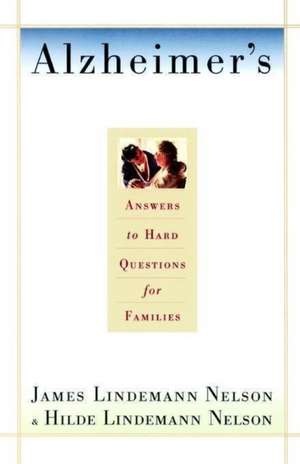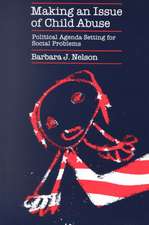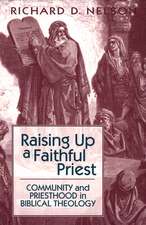Alzheimer's Hard Questions
Autor James Lindemann Nelson, Hilde Lindemann Nelson, Nelsonen Limba Engleză Paperback – 31 aug 1998
How much should the patient be told? How strongly should he be urged to plan for his own future? Is it ever right to lie to the patient about her condition? When is it right to place your loved one in a nursing home--and not feel guilty about it? How do different family members arrive at agreement among themselves in each of these situations?
Authors and bioethicists James and Hilde Lindemann Nelson have written an invaluable step-by-step guide to tackling these and other difficult decisions. Using their extensive research on moral issues in health care, the Nelsons create hypothetical scenarios that demonstrate some of the most common situations caregivers will have to face during every stage of the illness, and show by example how they can make the right choices for themselves, the patient, and the rest of the family. This invaluable information, combined with a state-by-state and city-by-city guide to agencies and support groups offering practical assistance, as well as a list of suggested reading on the subject, make this book unique--and the most complete source of advice available.
From the Hardcover edition.
Preț: 89.29 lei
Nou
Puncte Express: 134
Preț estimativ în valută:
17.09€ • 18.27$ • 14.25£
17.09€ • 18.27$ • 14.25£
Carte tipărită la comandă
Livrare economică 18 aprilie-02 mai
Preluare comenzi: 021 569.72.76
Specificații
ISBN-13: 9780385485340
ISBN-10: 0385485344
Pagini: 224
Dimensiuni: 138 x 218 x 14 mm
Greutate: 0.3 kg
Editura: Main Street Books
ISBN-10: 0385485344
Pagini: 224
Dimensiuni: 138 x 218 x 14 mm
Greutate: 0.3 kg
Editura: Main Street Books
Notă biografică
James and Hilde Lindemann Nelson have both been associated with the Hastings Center, a private research institution concerned with ethical issues in health care. They are the co-authors of The Patient in the Family: An Ethics of Medicine and Families. Both are now at the University of Tennessee, where James is a Professor of Philosophy teaching bioethics and Hilde is Director of the Center for Applied and Professional Ethics.
From the Hardcover edition.
From the Hardcover edition.
Extras
An exhausted, middle-aged woman stands in the bedroom doorway as the gray light of early morning outlines her father, asleep under the quilt. Barbara Kessler Johnson is just about drained. As she pulls her robe more tightly about her, she feels that with this gesture she is also holding herself together. Her dad, diagnosed several years ago as having Alzheimer's disease, is starting to stir, and she is dreading the moment when he will awake. It's not the "how-to" problems that are getting her down--how to get him to the bathroom, how to improve his appetite--it's the moral problems.
Mr. Kessler begins every morning by sitting up in bed and asking for his wife, who has been dead these twelve years. Barbara has learned the hard way that if she tells him the truth, however gently, however matter-of-factly, her father's grief will be as deep as if the loss were fresh. To him it is fresh, every time. Yet, if she tells a lie--if she says that her mother is out shopping, or visiting, or at work--she may have to fend off his questions all day long, piling further lies on top of the first one. Her father is not so demented that he always accepts what he's told without question; if she lies, he's likely to be suspicious and sometimes flat-out nasty, blaming his daughter for keeping his wife from him.
Barbara is profoundly tired of wrestling with this problem, and with all the other problems he causes as well. The refrain that's been running through her head for months starts up again: Dad really should be in a nursing home. But shortly after he was finally diagnosed, he asked her repeatedly to promise that she would never "turn him out of his own house." She gave him her word, and meant it. Of course, when she made that promise, Barbara didn't know what she knows now. She didn't know how hard it would be to take care of him. She didn't know that she'd be facing life without her own husband, who left her two years before to marry a woman both younger and unburdened by a demented father. And while she didn't have great hopes of her brothers, she didn't know they would leave virtually all of Dad's care to her.
As Barbara and tens of thousands of other family caregivers have discovered, a diagnosis of Alzheimer's or another dementing disease is devastating news, not only for the person suffering from it but for everyone who is "in close": spouse, children, nieces, nephews, and sometimes parents. People with these illnesses and their families feel despair and helplessness in the face of a future that seems full of terrible and altogether unavoidable problems.
Some of these problems are, of course, medical ones. Many dementias--Alzheimer's in particular--are difficult to diagnose. Family physicians too often pass over the symptoms of dementing diseases as "the natural effects of aging," while some victims are skillful at covering for themselves by playing down the impact of the early stages of their illnesses and, in general, helping themselves and their families to deny what they are all going through. Uninformed professionals and families in denial can conspire to keep the fundamental question, "What are we dealing with here?" waiting a long time for an answer--often, too long for the family and the patient to work out together the best ways of living with a dementing disease.
When questions about diagnosis are finally resolved, patients and families face new but equally urgent questions. What's going to happen from here on? When will it happen? How long will Mom be able to drive and to manage her own checkbook? How long can Dad continue to live independently, or to make decisions about his own health care? How long will my husband even recognize the people he has loved all his life? Is there any chance of slowing or maybe stopping the terrible destructiveness of the disease? What can medicine really do to help? Can those of us who love this person do anything? What resources are there in my community?
But when Barbara Johnson stands before her sleeping father she needs a different kind of help. She needs moral help. She's struggling to understand what exactly she's doing when she tells him the truth, how far she has to go to keep her promises, what adult children owe their frail and aging parents, what marriage is supposed to mean in sickness and in health, and what counts as a loving response from the rest of the family to those who do the hands-on care. All of these problems are moral ones, because they have to do with what's right to do, with how one ought to behave. And they all require active (even if temporary) solutions.
But Barbara's struggling with something else, too--something that's even harder than the solvable problems that are on her mind. She's struggling with how to live in the face of the problems she can't solve. And this is really the heart of the moral task that confronts her: to keep herself whole as she meets the challenge of her father's illness, without crumpling under the weight of it, without becoming hard and embittered, without protecting herself by turning away from her father's need. She has to figure out how to be faithful to her ongoing moral commitments and how to form the new ones that may be required. She has to know the difference between what can be helped and what can't, and she has to be able to revise her judgments as the disease progresses. She has to try to stand fast. For all of us, that is perhaps the most deeply moral activity. For those who have undertaken the care of a person with a dementing disease, it is also perhaps the most difficult.
This book is for Barbara and others who are struggling to be, feel, and do what is loving and responsible as they care for family members suffering from dementing diseases. It consists of stories--one to a chapter--we have created to describe what a particular family might be going through at a particular point in the progression of a dementing disease. None of the characters is intended to resemble anyone we know or have heard of, but their experiences are based on real-life stories told to us by over two dozen family caregivers, who are themselves grappling with the issues we raise here.
Stories--whether true or fictional--are always told by selecting certain details out of the vast array life lays before us, and arranging them in a way that makes sense. The stories in this book are no exception. They are told in an attempt to make sense of a crucial job families perform for their ill and, finally, dying loved ones. To make sense of that activity, however, we had to do more than to acknowledge and describe what the Barbaras of this world are going through. We had to offer ways of understanding it--ideas that might be of use to busy, distressed, and sometimes exhausted caregivers who have neither the time nor the energy to sort out all these things on their own. We spent a number of years at the Hastings Center--a research institute devoted to ethical issues in medicine--thinking about what the work of caregiving means in the context of family life. In these stories, we have combined our experience as researchers with the experiences of family members who are caring for loved ones with dementia.
From the Hardcover edition.
Mr. Kessler begins every morning by sitting up in bed and asking for his wife, who has been dead these twelve years. Barbara has learned the hard way that if she tells him the truth, however gently, however matter-of-factly, her father's grief will be as deep as if the loss were fresh. To him it is fresh, every time. Yet, if she tells a lie--if she says that her mother is out shopping, or visiting, or at work--she may have to fend off his questions all day long, piling further lies on top of the first one. Her father is not so demented that he always accepts what he's told without question; if she lies, he's likely to be suspicious and sometimes flat-out nasty, blaming his daughter for keeping his wife from him.
Barbara is profoundly tired of wrestling with this problem, and with all the other problems he causes as well. The refrain that's been running through her head for months starts up again: Dad really should be in a nursing home. But shortly after he was finally diagnosed, he asked her repeatedly to promise that she would never "turn him out of his own house." She gave him her word, and meant it. Of course, when she made that promise, Barbara didn't know what she knows now. She didn't know how hard it would be to take care of him. She didn't know that she'd be facing life without her own husband, who left her two years before to marry a woman both younger and unburdened by a demented father. And while she didn't have great hopes of her brothers, she didn't know they would leave virtually all of Dad's care to her.
As Barbara and tens of thousands of other family caregivers have discovered, a diagnosis of Alzheimer's or another dementing disease is devastating news, not only for the person suffering from it but for everyone who is "in close": spouse, children, nieces, nephews, and sometimes parents. People with these illnesses and their families feel despair and helplessness in the face of a future that seems full of terrible and altogether unavoidable problems.
Some of these problems are, of course, medical ones. Many dementias--Alzheimer's in particular--are difficult to diagnose. Family physicians too often pass over the symptoms of dementing diseases as "the natural effects of aging," while some victims are skillful at covering for themselves by playing down the impact of the early stages of their illnesses and, in general, helping themselves and their families to deny what they are all going through. Uninformed professionals and families in denial can conspire to keep the fundamental question, "What are we dealing with here?" waiting a long time for an answer--often, too long for the family and the patient to work out together the best ways of living with a dementing disease.
When questions about diagnosis are finally resolved, patients and families face new but equally urgent questions. What's going to happen from here on? When will it happen? How long will Mom be able to drive and to manage her own checkbook? How long can Dad continue to live independently, or to make decisions about his own health care? How long will my husband even recognize the people he has loved all his life? Is there any chance of slowing or maybe stopping the terrible destructiveness of the disease? What can medicine really do to help? Can those of us who love this person do anything? What resources are there in my community?
But when Barbara Johnson stands before her sleeping father she needs a different kind of help. She needs moral help. She's struggling to understand what exactly she's doing when she tells him the truth, how far she has to go to keep her promises, what adult children owe their frail and aging parents, what marriage is supposed to mean in sickness and in health, and what counts as a loving response from the rest of the family to those who do the hands-on care. All of these problems are moral ones, because they have to do with what's right to do, with how one ought to behave. And they all require active (even if temporary) solutions.
But Barbara's struggling with something else, too--something that's even harder than the solvable problems that are on her mind. She's struggling with how to live in the face of the problems she can't solve. And this is really the heart of the moral task that confronts her: to keep herself whole as she meets the challenge of her father's illness, without crumpling under the weight of it, without becoming hard and embittered, without protecting herself by turning away from her father's need. She has to figure out how to be faithful to her ongoing moral commitments and how to form the new ones that may be required. She has to know the difference between what can be helped and what can't, and she has to be able to revise her judgments as the disease progresses. She has to try to stand fast. For all of us, that is perhaps the most deeply moral activity. For those who have undertaken the care of a person with a dementing disease, it is also perhaps the most difficult.
This book is for Barbara and others who are struggling to be, feel, and do what is loving and responsible as they care for family members suffering from dementing diseases. It consists of stories--one to a chapter--we have created to describe what a particular family might be going through at a particular point in the progression of a dementing disease. None of the characters is intended to resemble anyone we know or have heard of, but their experiences are based on real-life stories told to us by over two dozen family caregivers, who are themselves grappling with the issues we raise here.
Stories--whether true or fictional--are always told by selecting certain details out of the vast array life lays before us, and arranging them in a way that makes sense. The stories in this book are no exception. They are told in an attempt to make sense of a crucial job families perform for their ill and, finally, dying loved ones. To make sense of that activity, however, we had to do more than to acknowledge and describe what the Barbaras of this world are going through. We had to offer ways of understanding it--ideas that might be of use to busy, distressed, and sometimes exhausted caregivers who have neither the time nor the energy to sort out all these things on their own. We spent a number of years at the Hastings Center--a research institute devoted to ethical issues in medicine--thinking about what the work of caregiving means in the context of family life. In these stories, we have combined our experience as researchers with the experiences of family members who are caring for loved ones with dementia.
From the Hardcover edition.
Recenzii
Praise for Hilde and James Lindemann Nelson's previous book, The Patient in the Family: An Ethics of Medicine and Families:
"This is a pioneering work...The Nelsons write clear, untechnical prose with an uncommonly fine eye for detail, and the case descriptions are superb."
--John Hardwig, East Tennessee State University
"Their critique of the current dogmas that tend to guide medical decision-making in the care of incompetent patients is very powerful. This is a clearly written, accessible book that will play a prominent role in subsequent discussions of health care ethics."
--Susan Sherwin, Dalhousie University
From the Hardcover edition.
"This is a pioneering work...The Nelsons write clear, untechnical prose with an uncommonly fine eye for detail, and the case descriptions are superb."
--John Hardwig, East Tennessee State University
"Their critique of the current dogmas that tend to guide medical decision-making in the care of incompetent patients is very powerful. This is a clearly written, accessible book that will play a prominent role in subsequent discussions of health care ethics."
--Susan Sherwin, Dalhousie University
From the Hardcover edition.
Descriere
The only book to guide readers through the difficult moral and ethical problems any family dealing with Alzheimer's disease will have to face, "Alzheimer's" provides an invaluable step-by-step guide to caring for an afflicted loved one. The authors create hypothetical scenes that demonstrate some of the most common situations caregivers have to face.











